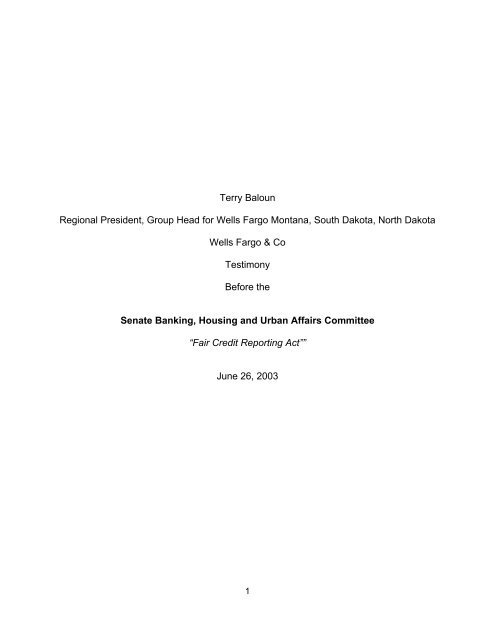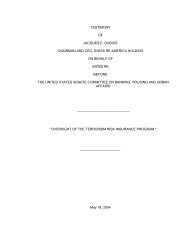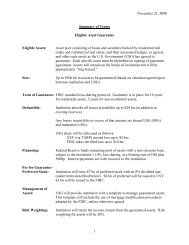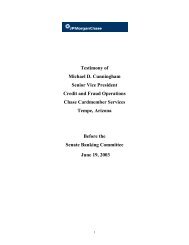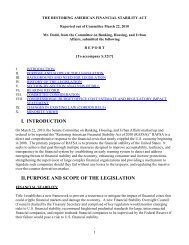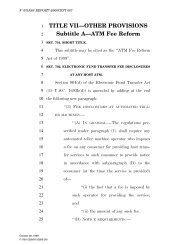Mr. Terry Baloun - U.S. Senate Banking, Housing and Urban Affairs ...
Mr. Terry Baloun - U.S. Senate Banking, Housing and Urban Affairs ...
Mr. Terry Baloun - U.S. Senate Banking, Housing and Urban Affairs ...
You also want an ePaper? Increase the reach of your titles
YUMPU automatically turns print PDFs into web optimized ePapers that Google loves.
<strong>Terry</strong> <strong>Baloun</strong>Regional President, Group Head for Wells Fargo Montana, South Dakota, North DakotaWells Fargo & CoTestimonyBefore the<strong>Senate</strong> <strong>Banking</strong>, <strong>Housing</strong> <strong>and</strong> <strong>Urban</strong> <strong>Affairs</strong> Committee“Fair Credit Reporting Act””June 26, 20031
My name is <strong>Terry</strong> <strong>Baloun</strong> <strong>and</strong> I am Regional President <strong>and</strong> Group Head for Wells Fargobanks located in South Dakota, North Dakota <strong>and</strong> Montana. Wells Fargo, our parentcompany, is a diversified financial services company, offering mortgage, securities,insurance, real estate services, online banking, institutional <strong>and</strong> retail banking productsunder the Wells Fargo br<strong>and</strong> through a number of separately incorporated affiliates to15 million customers nationwide. Wells Fargo’s headquarters is in San Francisco; thecompany has 130,000 employees, has mortgage offices nationwide, <strong>and</strong> has a retailbanking presence in 23 states.Thank you, Chairman Shelby <strong>and</strong> Committee Members for the invitation to testify <strong>and</strong>respond to your questions. I would like to share with you some of my experiences inproviding banking services to communities within the framework established by the FairCredit Reporting Act.Our Wells Fargo banks work in concert with other Wells Fargo business affiliates inproviding financial services products to customers. Marketplace experience shows thatconsumers expect the financial services companies they do business with to knowabout their accounts, to respond quickly to their questions <strong>and</strong> to advise them aboutproducts <strong>and</strong> services that will help them reach their financial goals. The serviceconsumers expect requires that Wells Fargo have integrated information systems togive customers what they want -- when, where <strong>and</strong> how they want it. Subject to the FairCredit Reporting Act, Wells Fargo shares customer information internally to meet thesegoals.2
Information Integration by Affiliates in the Same Corporate FamilyProviding a new mortgage, providing rural or remote small businesses with credit,offering consolidated statements for customers with multiple Wells Fargo productsrequires information about their financial affairs. Applying inappropriate restrictions ontransfers of information among affiliates would impede customer service.The 1996 amendments to the Fair Credit Reporting Act recognize the value tocustomers of the ability to transfer information among affiliates. This ability is whollyconsistent with consumer expectations that their questions will be answered <strong>and</strong> theirneeds will be met with a single call or a single e-mail message, whether their financialproducts are provided by a single company or several companies in the same affiliatedgroup. To put it another way, customers do not care whether for technical, regulatory, ormanagement reasons Wells Fargo chooses to organize itself into a particular series ofaffiliates of a holding company or subsidiaries of one bank. What customers do careabout is the seamless delivery of the products Wells Fargo offers regardless of how wechoose to distribute them.In Wells Fargo’s view it is consumer expectations <strong>and</strong> needs that should shape thepublic policy that regulates information use, not legal structure. Because of legalrequirements that prohibited or restricted bank branching, Wells Fargo at one timeowned numerous separately incorporated banks. The Riegle-Neal Act of 1994 allowedbank holding companies to consolidate banks into as few as a single charter. Today,3
for business reasons rather than legal reasons, Wells Fargo owns 28 separatelychartered banks. But the number of separate banks that a holding company chooses tohave should not affect public policy relating to information use. If a bank holdingcompany conducts its banking business in a single bank entity that bank would have allthe information about a customer who had deposits, a mortgage, a credit card <strong>and</strong> ahome equity loan from that bank. As a single corporate entity, it could use thisinformation without restriction to serve its customer.If, on the other h<strong>and</strong>, the bank holding company chooses to conduct its mortgage, creditcard <strong>and</strong> home equity loan businesses in three separately incorporated banks <strong>and</strong> thelaw restricted the sharing of information among affiliates, a customer who supplied thesame information for the same products to three affiliated institutions instead of a singleinstitution would not receive the same level of service from its financial servicescompany. To use customer information to provide the same level of service that couldbe provided by a single entity with the same information about the same customer, aholding company like Wells Fargo that provides services through multiple bank <strong>and</strong> nonbankcharters would have to consolidate its operations into as few charters as legallypossible. If the FCRA debate remains unresolved, institutions like Wells Fargo will likelychange their corporate structures to reduce the number of separate entities rather thanrisk restrictions on information sharing among affiliates. It is our view the corporatestructure should not be a factor in setting public policy regarding information use. Thetouchstone, instead, should be consumer expectation.4
This is especially critical to our mortgage business. Since passage of the 1996amendments to the Fair Credit Reporting Act, mortgage servicing has become moreefficient. Wells Fargo customers have more channels through which they can apply fora mortgage <strong>and</strong> get assistance or conduct transactions related to a mortgage, as wellas the complete array of financial products offered by Wells Fargo. In California, 40-50% of Wells Fargo’s mortgages originated this year are the result of referrals fromWells Fargo Banks to Wells Fargo Home Mortgage. Many are first-time homebuyers inHispanic market areas. With affiliate transfers <strong>and</strong> use of customer information,mortgage customers can make a mortgage payment at their local bank branch, obtainbalances, get consolidated statements <strong>and</strong> get the support of 24-hour call centers thatserve an entire affiliated enterprise. Our customers have found these services valuable.Sharing of customer information also benefits our small business customers. The basisfor small business lending over the last ten years has been direct mail offers ofpreapproved credit. Wells Fargo has extended nearly 500,000 small business loanssince the mid-1990’s. FCRA allows Wells Fargo to provide such credit, based on WellsFargo’s own experiences with the customer <strong>and</strong> the most current credit report.Generally, small businesses no longer need to submit tax returns or financialstatements, providing easier <strong>and</strong> cheaper credit for the business owner.Actions by multiple states to enact their own state versions of the Fair Credit ReportingAct will frustrate customers that do routine transactions across state lines. Wells Fargoprovides services to thous<strong>and</strong>s of customers that may have accounts “domiciled” in one5
state, yet reside or do business with a Wells Fargo bank in another state. Nearly half amillion Wells Fargo customers have made teller or ATM transactions out of state withinthe past 5 months. In my banking states of South <strong>and</strong> North Dakota <strong>and</strong> Montana,nearly 10% of Wells Fargo’s customers live in one state, but use Wells Fargo banks orATMs in a bordering state.Uniform National St<strong>and</strong>ardFinally, Wells Fargo believes the current uniform national st<strong>and</strong>ard for information use,as provided by the 1996 amendments to the FCRA is vital <strong>and</strong> asks that this Congressprovide clarity <strong>and</strong> stability by removing the sunset provisions that affect affiliate sharing<strong>and</strong> other segments of credit granting. Congress should also address identity theft <strong>and</strong>to set new national st<strong>and</strong>ards for notices about information use to customers. Theproblem of identity theft <strong>and</strong> complicated notices about information use are frustrating toboth customers <strong>and</strong> financial service providers.The availability of financial services, such as mortgages for our customers, <strong>and</strong> theflows of information required to make those services available do not stop at stateborders or corporate structures.Thank you <strong>and</strong> I would be happy to answer any questions that you, Chairman Shelby,or the Committee may have.6


